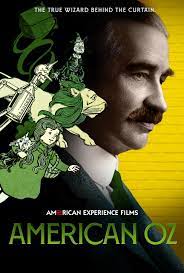
AMERICAN OZ
US, 2021, 112 minutes, Colour.
Voices of JoAnna Reinhart, Michael Stuhlbarg.
Directed by Randall MacLowry, Tracy Heather Strain.
American Oz is a television documentary part of the television series on the American Experience.
The film is trying to do two things at once. The main emphasis is a biography/portrait of American writer, L. Frank Baum, well-known as the author of The Wonderful Wizard of Oz. But, in trying to set Baum in his historical context, the film is also a study of changes in American society, especially from the 1880s to the 1910s.
On the biographical side, there is a lot of information about Baum himself, his family, growing up, his delight in writing, his imagination. He moved around a great deal which gives the film an opportunity for a lot of documentary footage and photos about different areas of the United States in the late 19th century, from open plains to industrial development, small towns, big cities like Chicago. The narration spends a great deal of time and focus on the range of changes, sometimes the rapidity of change, and the differences between frontier life and hardships to city life, and the fruits of success and wealth.
Audiences will enjoy the number of clips from the 1939 film with Judy Garland – some commentary as to how episodes of The Wizard of Oz are reflections of Baum’s experience, of hardship (dramatised in Kansas) but the possibility of taking responsibility for one’s life, following the yellow brick road, and the discovery that the Wizard himself was a phony.
On the one hand, Baum was very liberal in many of his views, especially the influence of his mother in law and his support of the suffragette movement. With his editing a paper in a country town, he had the opportunity write a number of editorials. On the other hand, one of his blindspots was Native Americans, his not considering them as part of his America, his being on the spot with the tour of Chief Sitting Bull – and the massacre of Wounded Knee. A number of his editorials and reflections were prejudicial and racist.
As The Wonderful Wizard of Oz became more popular, more books, big sales, many fans, especially children, Baum went to multimedia to spread the story, and the stories were adapted for the stage, with music. This film includes many excerpts showing the multimedia as well as some stage episodes.
Ultimately, Baum was a success with publishing, made money, travelled widely internationally with his wife, and retired comfortably to a mansion.
To that extent, his life was a personal dramatisation of American Oz.